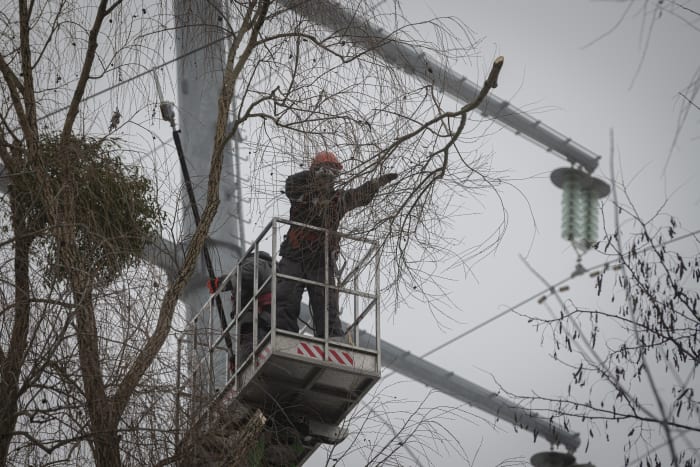Ukrainian utility crews adapted and overcame after Russian strike

Kyiv – With the shriek of a chainsaw pruning a tree, Ole Brachlnik a week ago in Kiev to repair a power line that was downed by a Russian missile and keep electricity flowing to fellow Ukrainians in need. I remember how the crew behaved.
Power company foreman Braharnyk knows the dangers. His family, like many others in Ukraine, daily blackout Because of the Russian strike.
“We’re sitting in the dark, too,” he says, admitting that his house only has power about half the day.
In recent months, Russia has been dropping missiles on Ukraine in an attempt to destroy the power grid installations, the facilities that turn on the lights, heat the space heaters and run the computers.is part of Moscow strategy Cripple the country’s infrastructure and freeze Ukraine into submission this winter.
Braharnyk’s crew is one of many in Kiev’s fast-moving energy company DTEK, keeping the city moving, sometimes under artillery and rocket fire. Colleagues across Ukraine are doing the same.
from President Volodymyr Zelensky Down, Ukrainian leaders said the gas system, water mains, and power plants new front line As the war approaches the 10-month mark.
About half of Ukraine’s energy supply network remains damaged after the widespread attacks on November 23, which DTEK declared “the power system has failed”.
During the barrage, six of the company’s thermal power plants shut down and 70% of the population of the Ukrainian capital lost power. The power plant he resumed operations within 24 hours, but during the day about 30% of Kiev residents were affected by the blackout, and at night she dropped to 20%, said DTEK spokesperson Antonina. Antosha said.
DTEK, which works closely with Ukrainian energy company NEC Ukrenergo, said Russian forces had attacked its facilities 17 times since early October, including twice on Mondays alone. The company has reported more than 106 employee deaths since Russia’s invasion of Ukraine in late February, the majority of them military personnel, but 14 off-duty or on duty. He said he died.
Three Ukrainian energy workers have been killed and 24 injured in the past week, according to DTEK.
As they trimmed branches near overhead power lines that supply power to homes and businesses on much of the left bank of the capital’s Dnieper on Thursday, the Braharnyk’s crew has nothing more to worry about than freezing temperatures and accumulated snow. It was very rare.
That doesn’t dampen their constant alertness. When the missiles began dropping in the mid-afternoon of 23 November, the crew rushed to an unidentified emergency site to assess the damage and quickly determine what repairs were needed within hours. . His second “brigade” was then called in to do the actual repair work.
“Three or four lines were broken,” says Braharnyk, and it took several hours of work to install new lines.
The crew can’t just run in. In theory, but not always in practice, demining experts are expected to arrive first and make clear that there is no danger from unexploded ordnance. Then, if necessary, cleanup crews clear debris and debris from downed lines and blow them up so trucks and heavy equipment can complete repairs.
Attacks targeting infrastructure are no more dangerous than those early in the war, when Russian forces advanced on the outskirts of Kiev and some areas of the capital before being pushed back. rice field.
“It was worse,” recalls Braharnyk. “It’s better these days because rockets are being launched from far away.”
Ukraine has adapted. A popular mobile phone app, whose title translates to Air Alarm, periodically sounds a warning that a Russian strike is underway in designated areas.
In light of Russia’s new strategy, “When we heard that a strike was coming from Russia, we already knew they were targeting power and transmission lines,” Braharnyk said.
The DTEK crew now remains close to the base of operations, ready to load and deploy immediately. The risks are still real.
“I’m still unsure because who knows if they’ll do a double hit when they deploy to repair the site they just hit,” he said.
The mental burden is also heavy.
“The hardest part is… hearing the explosions and the attacks, and I don’t know what exactly they are. It could be a SWAT team that does well,” said Braharnyk.
For power company crews, it’s about getting the job done “no matter what’s going on around us.” “We’re just here to fix it.”
___
Follow AP’s coverage of the war in Ukraine. https://apnews.com/hub/russia-ukraine
Copyright 2022 The Associated Press. All rights reserved. This material may not be published, broadcast, rewritten or redistributed without permission.
https://www.local10.com/business/2022/12/10/ukraine-utility-crews-adapt-overcome-after-russian-strikes/ Ukrainian utility crews adapted and overcame after Russian strike



